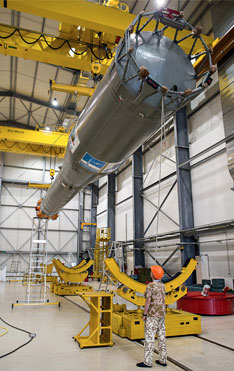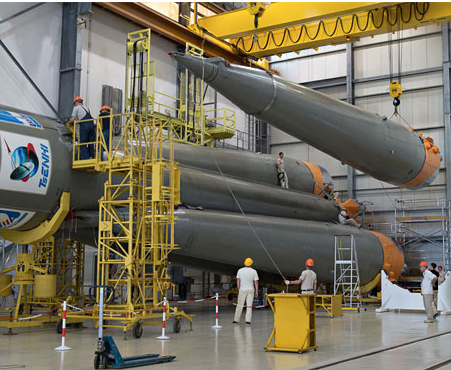[SatNews] The Soyuz launcher for Arianespace’s upcoming mission with two European Galileo navigation satellites is taking shape at the Spaceport for a March 27 liftoff from French Guiana.

The Block A core second stage for Arianespace’s Flight VS11 Soyuz is lowered into position (photo at left)

Preparing for the integration of its four first-stage strap-on boosters (at right) during activity at the Spaceport in French Guiana.
During activity in the Spaceport’s Soyuz Launcher Integration Building, the medium-lift workhorse began to assume its iconic form with integration of the four first-stage strap-on boosters to the Block A core second stage.
The next step will be the mating of Soyuz’ Block I third stage to the launcher’s core, completing the basic build-up, and readying the vehicle for
its rollout to the launch pad, where the payload will be mated.
Arianespace’s March 27 flight will be the 11th Soyuz flight from French Guiana since the launcher’s introduction at the Spaceport in October 2011. It is designated Flight VS11 in Arianespace’s numbering system for its launcher family, which also includes the heavy-lift Soyuz and lightweight Vega.
For the upcoming Soyuz mission, Arianespace will loft the third and fourth Galileo Full Operational Capability (FOC) satellites to further expand the constellation for Europe’s space-based navigation system. Flight VS11’s two satellites were built by OHB System, with Surrey Satellite Technology Ltd. supplying their navigation payloads.
Galileo’s complete operational network and its ground infrastructure will be deployed during the program’s Full Operational Capability phase, which is managed and funded by the European Commission. The European Space Agency has been delegated as the design and procurement agent on the Commission’s behalf.